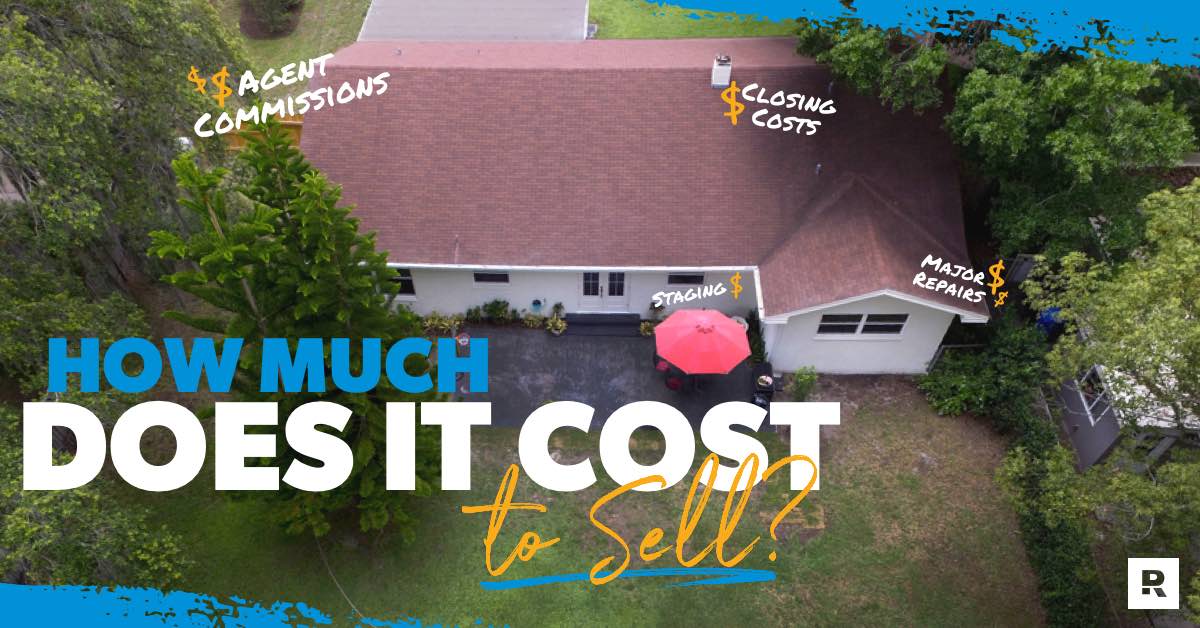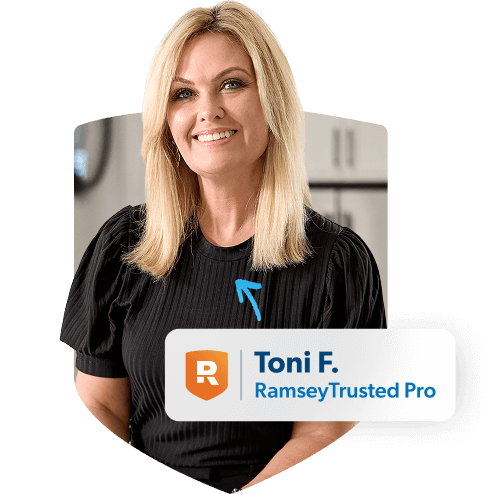
Key Takeaways
- The total cost to sell a house typically lands around 15% of the sale price once all fees and expenses are added up.
- Major costs include real estate agent commissions, closing costs, and the remaining mortgage balance.
- Sellers often spend extra on home inspections, repairs, staging and moving—especially if the home needs work before listing.
- You can lower costs by doing repairs or staging yourself, cutting moving expenses, and asking your employer about relocation assistance.
Selling your house can bring in a big chunk of cash—maybe even the biggest payday you’ve ever had. If that’s where you are right now, you’re probably dreaming about how much you could make from the sale. But before you start counting your dollars, here’s the real question: How much does it cost to sell a house?
The short answer to that question is about 15% of your home’s sale price—but some people don’t realize how expensive selling a house really is until they’re knee-deep in paperwork and fees. But that won’t be you!
We’re going to walk you through the most common expenses people run into when they sell their home—so you can plan ahead, set a solid budget, and steer clear of any financial surprises.
What’s the Cost of Selling a House?
The average cost to sell a house is in the neighborhood of 15% of its sale price—which includes agent commissions, home improvements, closing costs and moving expenses. So if you sell a home for $300,000, you might pay around $46,000 to cover selling expenses.
That may sound like a lot. But keep in mind, the cost to sell a house is different for every seller. In fact, you might be able to skip certain selling expenses depending on your situation.
Here’s what a home-selling budget might look like:
|
Home Sale Price: $300,000 |
Seller’s Cost |
Percentage of Sale Price |
|
Real estate agent commissions |
$18,000 |
6% |
|
Closing costs |
$9,000 |
3%1 |
|
Home inspection |
$3432 |
<1% |
|
Improvements and repairs |
$14,8283 |
4–5% |
|
Home staging |
$1,8494 |
<1% |
|
Moving costs |
$1,7105 |
<1% |
|
Total selling costs* |
$45,730 |
~15% |
*Not including mortgage payoff
Breakdown of Home-Selling Costs
The numbers in this budget are only rough estimates of what a seller might pay when selling a $300,000 home. To get a better idea of how much these budget items will cost in your situation, let’s unpack each category.
Real Estate Agent Commissions
When you sell a house, one of the main expenses will likely be paying your real estate agent. Seller’s agents usually either get paid a flat fee, an hourly rate or a commission (for example, 3% of the sales price). And sometimes, sellers offer to sweeten the deal by also paying for part or all of the buyer’s agent fees.
How much does that come out to? If you sold a $300,000 house and paid both your agent and the buyer’s agent a 3% commission, the bill would come out to $18,000. That may seem like a lot, but paying for a real estate agent is worth every penny.
Here’s why: Agents who eat, sleep and breathe real estate can communicate the right expectations so you’ll feel confident throughout the selling process. They’ll give you experienced advice about how to prepare your home for buyers and give you a tried-and-true marketing plan to get your home sold on your timeline. Agents can also earn you the big bucks by providing muscle at the negotiating table.
All that expertise pays off for you when your home sells. Last year, sellers who worked with an agent sold their homes for a median of $435,000—that’s $55,000 more than people who didn’t use an agent.6 Cha-ching!
So, while some folks may try to tell you that selling without an agent is a good way to save money, they’re just plain wrong. It’s a bad idea!
Buy or Sell Your Home With an Agent Who Puts You First
Finding a reliable agent who actually cares can be a headache. But RamseyTrusted® makes it easy—connecting you with local market experts who’ll fight for you to get the best deal.
Closing Costs
You’ll have to cover a few other miscellaneous closing costs in addition to agent commissions. These include prorated property taxes for the year, remaining HOA fees, lender’s title insurance, title transfer, attorney costs and other government fees that depend on where you live.
In some cases, you might want to sweeten the deal by offering to cover some of the buyer’s closing costs too. This is known as a seller concession, and it can make your listing stand out from the crowd.
Home Inspection
A home inspection, which typically runs around $300–420, can uncover problems with plumbing, electrical systems, HVAC, the roof, or even the foundation a house is sitting on.7 You can either fix any issues you find before you list the house for sale, or you can adjust your sale price and list the home “as-is.”
Typically, the buyer pays for a home inspection to avoid getting hoodwinked into buying a money pit. But if you budget for an inspection before listing your home, you’ll have a chance to fix things ahead of time. That way, home repairs won’t slow down the closing process—or cause frantic buyers to change (or cancel) their original offer.
Improvements and Repairs
Many sellers make at least one improvement to their home before selling it, and you may want (or need) to do the same. Common improvement projects include landscaping the yard, updating bathrooms and kitchens, replacing carpet or flooring, painting the exterior or interior, and redecorating.
Your home inspector may also discover you need some repairs, and those can be costly. If your house is brand-spankin’ new, you probably don’t have to worry about this. But if your house was built by pilgrims, it might need some work.
Home Staging
Home staging is all about transforming your house into a warm, welcoming space buyers will want to call their own—which means bigger bucks for you on a faster timeline. The cost of staging a home will depend on how much work your home needs to get it ready and how much of the work you decide to do on your own. On average, home staging costs about $1,850.8
Staging costs include things like hiring a staging company, ordering cleaning services, renting furniture, installing brighter lighting, updating cabinets, and applying a fresh coat of paint.
Keep in mind, these costs might be covered by your real estate agent as part of their marketing services.
Your Guide to Selling Your Home for Top Dollar
Learn our simple, step-by-step process that’ll steer you toward a quick and successful home sale and smart selling decisions.
Moving Costs
Moving costs can sneak up on you—especially if you’re not prepared. On average, hiring professional movers costs about $1,710.9 That might be a smart tradeoff if it fits your budget and gives you back some time. But if not, there are other routes that can save money—like renting a truck or trailer and doing the heavy lifting yourself.
The important thing is to plan ahead. Compare your options, count the cost, and make a choice that works for your budget.
Remaining Mortgage Balance
If you’ve got a mortgage on your home, another closing cost you’ll pay is the remaining loan balance—which should be covered by what you make on the sale.
For example, let’s say after 10 years of paying down your mortgage, you’re left with a remaining balance of $80,000. Now suppose you sell your home for $300,000. You use $46,000 of the sale earnings to cover selling expenses and $80,000 to pay off the mortgage. That leaves you with $174,000—a pretty sweet down payment for your next home!
If, for any reason, you’re upside down or underwater on your mortgage (meaning the loan balance is higher than the current value of your home), now probably isn’t a good time to sell your house. Because if you did sell, you wouldn’t earn enough money to pay off your mortgage. Plus, you’d have to pay all the costs that go along with selling a house.
So hang tight and keep paying down your mortgage if it’s upside down. Let the value of your home grow until you can earn enough from the sale to knock that mortgage out of the park!
How Can I Reduce the Cost of Selling My House?
Here are a few smart ways to cut costs without cutting corners:
- DIY what you can. Break out your power tools and safety goggles! If you’re handy with landscaping, carpentry, painting or other small repairs, doing the work yourself can save you hundreds—maybe even thousands—on home repair and staging costs. Just make sure the quality holds up. Buyers notice the details.
- Trim your moving costs. The less you move, the less you spend. Start by decluttering and selling anything you don’t need to take with you. Ask local stores for free boxes and skip the moving company if you can rally some friends to help. (Just don’t forget to thank them with pizza!)
- Ask about relocation assistance. If you’re moving for a new job, check to see if your company offers a relocation package. Many employers will cover part or all of your moving costs—like transportation, temporary housing or professional movers—as part of their hiring package.
Ready to Sell Your House?
If you’re ready to put the calculator down and start selling, get the ball rolling with a local real estate agent. For a fast and easy way to find the top-performing agents in your market, try our RamseyTrusted® program. We only recommend reliable agents who make it their personal mission to help you crush your real estate goals.
Find a RamseyTrusted estate agent!
Next Steps
- Budget for around 15% of your home’s sale price to cover selling-related costs.
- Look through each expense—like repairs, staging and moving—and see where you can cut costs without cutting corners.
- Connect with a RamseyTrusted real estate agent to help you sell your home with confidence.
Did you find this article helpful? Share it!

We Hear You!
We’re considering adding the ability to save articles to your Ramsey account.




